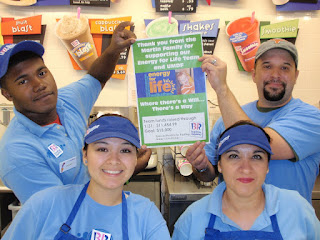http://www.wired.com/magazine/tag/genetic-mutation/
Neil found this article and since my mom has Parkinson's and it's closely related to mitochondrial disorders I thought it would be relevant to our blog. $50 million to "move the needle" on Parkinson's research... I wonder how I could convince someone like Bill Gates or Warren Buffet to realize they have mito - good or bad - and it's worthy of just $5 million.
Several evenings a week, after a day’s work at Google headquarters in Mountain View, California, Sergey Brin drives up the road to a local pool. There, he changes into swim trunks, steps out on a 3-meter springboard, looks at the water below, and dives.
Brin is competent at all four types of springboard diving—forward, back, reverse, and inward. Recently, he’s been working on his twists, which have been something of a struggle. But overall, he’s not bad; in 2006 he competed in the master’s division world championships. (He’s quick to point out he placed sixth out of six in his event.)
The diving is the sort of challenge that Brin, who has also dabbled in yoga, gymnastics, and acrobatics, is drawn to: equal parts physical and mental exertion. “The dive itself is brief but intense,” he says. “You push off really hard and then have to twist right away. It does get your heart rate going.”
There’s another benefit as well: With every dive, Brin gains a little bit of leverage—leverage against a risk, looming somewhere out there, that someday he may develop the neurodegenerative disorder Parkinson’s disease. Buried deep within each cell in Brin’s body—in a gene called
LRRK2, which sits on the 12th chromosome—is a genetic mutation that has been associated with higher rates of Parkinson’s.
Not everyone with Parkinson’s has an LRRK2 mutation; nor will everyone with the mutation get the disease. But it does increase the chance that Parkinson’s will emerge sometime in the carrier’s life to between 30 and 75 percent. (By comparison, the risk for an average American is about 1 percent.) Brin himself splits the difference and figures his DNA gives him about 50-50 odds.
That’s where exercise comes in. Parkinson’s is a poorly understood disease, but research has associated a handful of behaviors with lower rates of disease, starting with exercise. One study found that young men who work out have a 60 percent lower risk. Coffee, likewise, has been linked to a reduced risk. For a time, Brin drank a cup or two a day, but he can’t stand the taste of the stuff, so he switched to green tea. (“Most researchers think it’s the caffeine, though they don’t know for sure,” he says.) Cigarette smokers also seem to have a lower chance of developing Parkinson’s, but Brin has not opted to take up the habit. With every pool workout and every cup of tea, he hopes to diminish his odds, to adjust his algorithm by counteracting his DNA with environmental factors.
“This is all off the cuff,” he says, “but let’s say that based on diet, exercise, and so forth, I can get my risk down by half, to about 25 percent.” The steady progress of neuroscience, Brin figures, will cut his risk by around another half—bringing his overall chance of getting Parkinson’s to about 13 percent. It’s all guesswork, mind you, but the way he delivers the numbers and explains his rationale, he is utterly convincing.
Brin, of course, is no ordinary 36-year-old. As half of the duo that founded Google, he’s worth about $15 billion. That bounty provides additional leverage: Since learning that he carries a LRRK2 mutation, Brin has contributed some $50 million to
Parkinson’s research, enough, he figures, to “really move the needle.” In light of the uptick in research into drug treatments and possible cures, Brin adjusts his overall risk again, down to “somewhere under 10 percent.” That’s still 10 times the average, but it goes a long way to counterbalancing his genetic predisposition.
It sounds so pragmatic, so obvious, that you can almost miss a striking fact: Many philanthropists have funded research into diseases they themselves have been diagnosed with. But Brin is likely the first who, based on a genetic test, began funding scientific research in the hope of escaping a disease in the first place.
His approach is notable for another reason. This isn’t just another variation on venture philanthropy—the voguish application of business school practices to scientific research. Brin is after a different kind of science altogether. Most Parkinson’s research, like much of medical research, relies on the classic scientific method: hypothesis, analysis, peer review, publication. Brin proposes a different approach, one driven by computational muscle and staggeringly large data sets. It’s a method that draws on his algorithmic sensibility—and Google’s storied faith in computing power—with the aim of accelerating the pace and increasing the potential of scientific research. “Generally the pace of medical research is glacial compared to what I’m used to in the Internet,” Brin says. “We could be looking lots of places and collecting lots of information. And if we see a pattern, that could lead somewhere.”
In other words, Brin is proposing to bypass centuries of scientific epistemology in favor of a more Googley kind of science. He wants to collect data first, then hypothesize, and then find the patterns that lead to answers. And he has the money and the algorithms to do it.
























